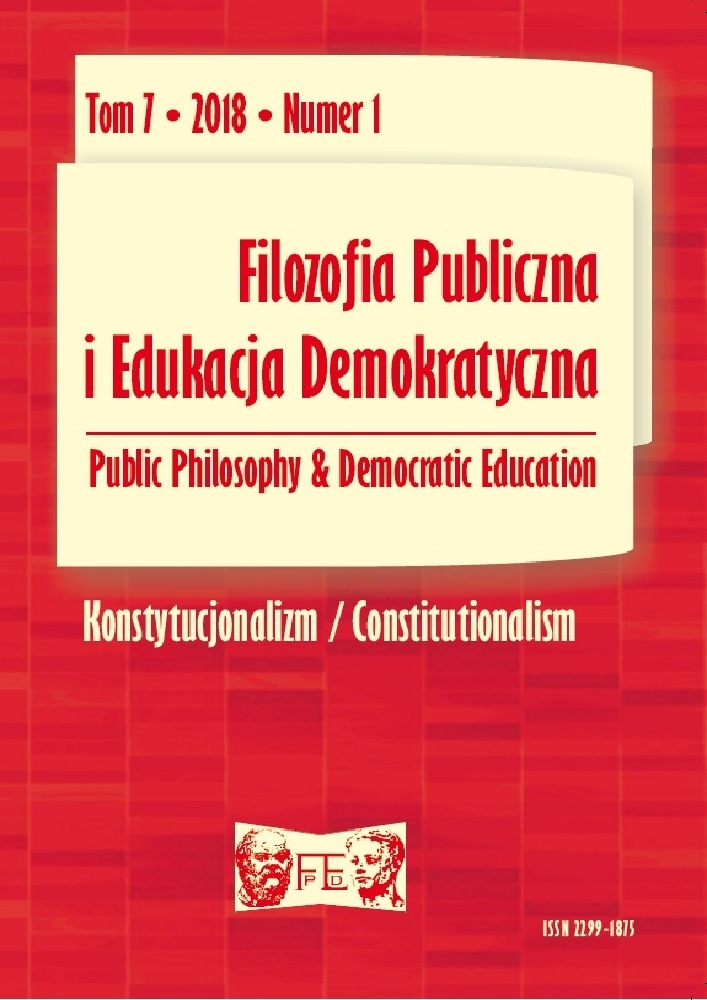Abstract
This paper debates abusive constitutionalism and constitutionalism abused as ways to introduce a fundamental change of political system. Abusive constitutionalism consists in a change of a democratic regime in a less democratic one with the help of democratic means, i.e. democratically legitimized change of the existing constitution, or proclamation of a new constitution, as it recently happened in Hungary. An example of abused constitutionalism presents contemporary Poland. There the fundamental change of democratic regime happens notwithstanding the still binding constitution, as in an oblivion of it, by the means of ordinary laws proclaimed in a rush process by the ruling parliamentary majority. The whole process is steered in an informal way by the chairman of the ruling party. The important context of abusive constitutionalism, and of constitutionalism abused, as I am going to argue, presentst he crisis of liberal constitutionalism, the loss of its motivational force as a moral sign-post in the public sphere. Instead, one observes a retreat to some primordial and emotionally laden conceptualizations of a politically organized community (a Gemeinschaft) where emotions, primary bonds, foundational myths are more important than law and liberal constitution. Such a retreat results from the past but also presents a reaction to the growing complexity of the contemporary world, and involved risks.
References
Agamben Giorgio, Wspólnota, która nachodzi, Wydawnictwo Sic!, Warszawa 2008.
Alvarez Angel E., „Venezuela: Political Governance and Regime Change by Electoral Means”, w: Jorge I. Dominguez, Michael Shifter (eds), Constructing Democratic Governance in Latin America, Johns Hopkins University Press, Baltimore 2003, s. 316–339.
Blokker Paul, „Politics and the Political in Sociological Constitutionalism”, w: Paul Blokker, Chris Thornhill (eds), Sociological Constitutionalism, Cambridge University Press, Cambridge 2017, s. 178–209.
Brewer-Carías Allan R., Dismantling Democracy in Venezuela: The Chávez Authoritarian Experiment, Cambridge University Press, New York 2010.
Dahrendorf Ralf, Die Chancen der Krise. Über die Zukunft des Liberalismus, Deutsche Verlags-Anstalt, Stuttgart 1983.
„Duda w Kamiennej Górze porównał UE do zaborców?”, 13.03.2018, http:// wiadomosci.gazeta.pl/wiadomosci/7,114884,23139252,duda-w-kamiennej-gorze-porownal-ue-do-zaborcow-polityczna.html [dostęp: 1.06.2018].
Fuller Lon L., Moralność prawa, Państwowy Instytut Wydawniczy, Warszawa 1978.
Grimm Dieter, „Die Verfassung im Prozess der Entstaatlichung” w: Michael Brenner et al. (Hrsg.), Der Staat des Grundgesetzes – Kontinuität und Wandel: Festschrift für Peter Badura zum siebzigsten Geburtstag, Mohr Siebeck, Tübingen 2004, s. 145–168.
Grimm Dieter, „Integration by Constitution”, International Journal of Constitutional Law 2005, no. 3, s. 193–208.
Habermas Jürgen, Die neue Unübersichtlichkeit. Kleine politische Schriften, Suhrkamp, Frankfurt am Main 1985.
Holmes Steven, Passions and Constraints: On the Theory of Liberal Democracy, University of Chicago Press, Chicago 1995.
Landau David, „Abusive Constitutionalism”, UC Davis Law Review 2013, vol. 47, no. 1, s. 189–260, dostępny również online: FSU College of Law, paper No. 646 SSRN, https:// ssrn.com/abstract=2244629 [dostęp: 1.06.2018].
Nykiel Marzena, „Polska potrzebuje konstytucji, która ochroni interes narodowy. Decyzja prezydenta daje szansę na wzmocnienie suwerenności. Czy Targowica znowu uderzy?”, 3.05.2017, http:// wpolityce.pl/polityka/338212-polska-potrzebujekonstytucji-ktora-ochroni-interes-narodowy-decyzja-prezydentadaje-szanse-na-wzmocnienie-suwerennosci-czy-targowica-znowu-uderzy [dostęp: 5.07.2018].
Orban Viktor, „Prime Minister Viktor Orban Speech at the 25th Balvanyos Summer Free University and Student Camp (26 of July 2014)”, w: Freedom House Report, Chapter 5: Illiberal Democracies, http:// freedomhouse.org/report/modern-authoritarianism-illiberal-democracies [dostęp: 5.07.2018].
Pitkin Hanna, „The Idea of a Constitution”, Journal of Legal Education 1987, vol. 37, s. 167–169.
Putnam Robert, Demokracja w działaniu. Tradycje obywatelskie we współczesnych Włoszech, Znak, Kraków 1995.
Repeta Lawrence, „Get Ready for New Battles over Japan’s Constitution”, Int’L J. for Constitutional Law Blog, 7.02.2013.
Sadurski Wojciech, „Transitional Constitutionalism. Simplistic and Fancy Theories”, w: Martin Krygier, Adam Czarnota, Wojciech Sadurski (eds), Rethinking the Rule of Law after Communism,CEU Press, Budapest–New York 2006, s. 9–24.
Sajó András, Constitutional Sentiments, Yale University Press, New Haven–London 2011.
Santiago Nino Carlos, The Constitution of Deliberative Democracy, Yale University Press, New Haven–London 1996.
Schütz Alfred, „Światły obywatel. Esej o społecznym zróżnicowaniu wiedzy”, Literatura na Świecie 1985, nr 2, s. 269–284.
Skąpska Grażyna, „Społeczeństwo w społeczeństwie. Socjologiczne koncepcje konstytucjonalizmu po komunizmie”, Studia Socjologiczne 2005, nr 4, s. 18–35.
Skąpska Grażyna, From „Civil Society” to „Europe”: A Sociological Study on Constitutionalism after Communism, Brill, Leiden–Boston 2011.
Sunstein Cass R., „On the Expressive Function of Law”, Eastern European Constitutional Review 1996, vol. 5, no. 1, s. 66–72.
Szacki Jerzy, „O języku debaty europejskiej”, w: L. Kolarska--Bobińska (red.), Polska eurodebata, Instytut Spraw Publicznych, Warszawa 1999.
Szczęśniak Agata, „Dziś już wiemy. «Polska powstała gdzieś między 1968 a 1972 rokiem»”, 18.02.2018, https:// oko.press/dzisjuz-wiemy-polska-powstala-gdzies-miedzy-1968-a-1972-rokiem/ [dostęp: 1.06.2018].
License
Copyright (c) Authors retain copyright and publishing rights to their articles in this journal, granting the journal the right to distribute them under the terms of the CC BY-NC-ND 4.0
